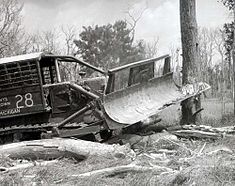
Rome plows were large, specially modified armored bulldozers used in South Vietnam by the United States military during the Vietnam War.
Background
The plows took their name from the city of Rome, Georgia, where they were made by the Rome Plow Company (now located in Cedartown, Georgia).[ citation needed]
The plow tractors were equipped with a very sharp "stinger blade" which weighed more than two tons and was able to cut down trees, which were then burned. When fully equipped, a Rome plow tractor weighed 48,000 pounds (22,000 kg) without the rome plow kit. [1] Rome plows were mounted on Caterpillar D7E bulldozers of the 59th, 60th, 501st, 538th, 687th, and 984th Engineer Companies (Land Clearing).
Deployment
Rome plows were first used in III Corps (Military Region III) to destroy trees and other jungle flora that could be used by enemy forces. Major land clearance operations did not commence, however, until May 1967 with the arrival of the 169th Engineer Battalion. [2]
The plows were assigned a tank platoon and an infantry company for security. These would, prior to plowing operations, send preparatory machinegun, mortar, and 90mm tank guns into the forests and jungles; subsequent fire was continuously directed into uncleared areas to deter ambushes while the Rome plows performed their task. [3] A search team, consisting of an infantry platoon and a squad of engineers, was also on hand to destroy any enemy installations, such as camps and tunnels, that were encountered, as well as to gather information. [4]
During the American incursion into Cambodia on 1 May 1970, Rome plows cleared over 1,700 acres (6.9 km2) of jungle near the Fishhook region, and destroyed over 1,100 enemy positions. [5]
Legality
Richard Falk, a professor of international law and a prominent opponent of the war, wrote in 1973: "I think it is not easy to conclude that Rome plowing, however much it offends ecological consciousness, constitutes a violation of existing standards of international law." [6] Citing post-World War II indictments against nine German officials who had overseen "the wholesale cutting of Polish timber to an extent far in excess of what was necessary to preserve the timber resources of the country", however, he also concluded that "it is possible to view such environmental devastation as an instance of 'a crime against humanity' in the Nuremberg sense". [6]
Popular culture
The American rock band Drive Like Jehu's 1994 album Yank Crime contains a song entitled "Here Come the Rome Plows."
See also
Notes
- ^ "Home". 59thlandclearing.org.
- ^ Starry 2002, pp. 147–8.
- ^ Starry 2002, pp. 148–9.
- ^ Starry 2002, p. 148.
- ^ Starry 2002, p. 176.
- ^ a b Falk 1976, p. 295.
Sources
- Falk, Richard A. (1976). "Environmental Warfare and Ecocide". In Richard A. Falk, ed., The Vietnam War and International Law, Volume 4: The Concluding Phase, pp. 287–304. American Society of International Law. Princeton, NJ: Princeton University Press. ISBN 0-691-09230-3.
- Starry, Donn A. (2002) [1978]. Mounted Combat in Vietnam (PDF). Vietnam Studies. Washington, DC: Department of the Army.